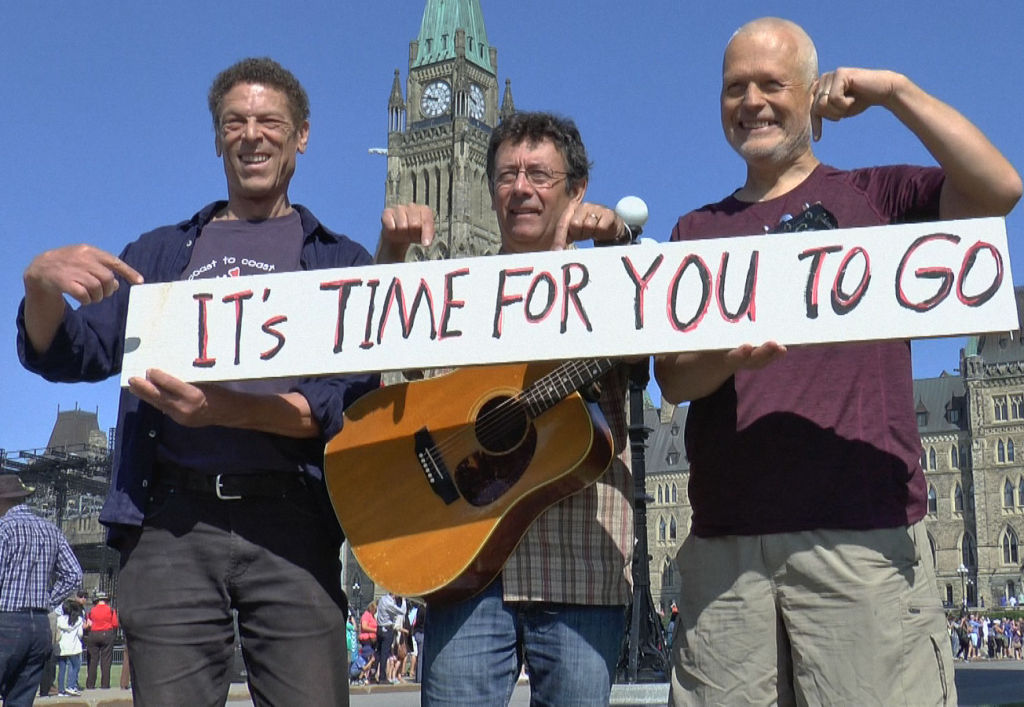
Tony Turner is holding his 1972 acoustic Gibson Heritage guitar in the Youtube music video. He looks far from the type you’d suspect of seeking to overthrow a government. It’s the spring of 2015 and he is wearing an unassuming dark periwinkle button-down shirt with the sleeves rolled up to the elbow and a pair of chinos. Turner is more ‘Office Casual’ than he is ‘The Man in Black’.
He’s playing his rosewood guitar and singing his protest song with 40 background singers swaying behind him. Their sun hats are decorated with colourful buttons and artificial flowers.
“Who squashes all dissent? Harperman, Harperman,” Turner sings. It’s a line most of us heard during the last federal election in our social media feeds. It was a song that became a viral sensation, a hashtag and an anthem for change.
Turner, an environmental scientist focusing on songbird migration patterns, put his job on the line this summer when he shared his anti-Harper anthem. A documentary on the story is set to be released in January called A Dissident Serenade by Cody Langtree and Zeta Hagerty. It covers the issues of censorship and freedom of expression in Canada this last decade.
Turner worked for Environment Canada for nearly twenty years. His most recent project was coordinating the mapping of priority songbirds’ habitat in the Boreal forest.
At the end of August, his employers sent him a letter stating he was being suspended pending an inquiry. His employer alleged that Turner violated their values and ethics code by creating this song.
“The election had been going on for four weeks, when all hell breaks loose,” said Andrew Hall, the videographer of the Harperman music video. “It just seemed like the perfect time. It was the Friday of the last weekend of summer. There’s not a lot of news. The thing drops like a bomb.”
“You really see the power of social media,” Hall said. “It certainly raised the profile of the cross-country singalong. We’re just ordinary Canadians out to basically raise shit.”
What makes an environmental scientist want to raise shit? Turner’s childhood was ordinary enough.
Turner first fell in love with music at his family’s rented cottage north of Toronto when he was about ten years old. “It was the summer of 1963 before most of the world had heard of the Beatles,” he recalled. It was at the tail end of a period when folk music was big on the pop charts. Songs like Mockingbird and If I Had a Hammer dominated the airwaves that summer while a young Turner snacked on his favourite Cheez Whiz and ketchup sandwiches.
When he wasn’t at the beach or goofing around, he had the habit of listening to the radio during the long summer days. The lyrics and melodies got into his head. Six months later the Beatles changed everything. His generation embraced the new wave. And that’s when he started making music.
In spring of 2015 Turner entered a song-writing competition organized by his friend and fellow folk music enthusiast Chris White. Gil’s Hootenanny is a folk music event that takes place each year for May Day. Contestants had to write either a song of protest or hope because, as White describes, they are just two sides of the same coin.
When Turner won the contest, White suggested Hall film the music video. The video was posted on June 22. It got many views right away.
“I still remember,” White said, “how Andrew told us all just before starting the camera how important it was that we all smile. People are attracted to smiling faces. That was his theory. I think that’s what made it spread.”
Turner didn’t attend the first cross-country singalong. He felt muzzled. He thought it wouldn’t help the inquiry if he continued playing his song. But when weeks passed and there was still no word on his fate at Environment Canada he realized that it was not going to be the timely process his superiors had told him it would be.
“I think it was a political move on their part,” Turner said. “It’s likely they just wanted to keep me quiet until after the election.” That was when he decided to switch gears and just let go. He retired early, with five days’ notice to his employers. He was glad to be free to head to the Parliament Hill singalong event on Oct. 18 – the day right before the election.
“Right after I retired I was invited by Elizabeth May to sing at two rallies in B.C.,” said Turner. “The fact that she asked me felt like vindication for the treatment I had received from Environment Canada for writing and performing Harperman.” He played at three rallies in Victoria where he says he was “treated like a rock star”. May led an auction and got $550 for each Harperman lawn sign Turner had brought along.
Turner believes folk is music by the people, for the people. “What it can do is bring people together,” Turner said. “If you read the lyrics to the song it would appeal to your intellect but when you hear it in music it appeals to your emotion too. It’s that emotional connection that channels people’s anger and their feeling disenfranchised but it also brings them together.”
Turner has other projects up his dark periwinkle shirt sleeve. A new album is in the works called Love and Other Attractions. It features eleven songs with the overarching theme of love, and one called The Beatles Changed Everything. They did indeed change everything for Turner.
This isn’t the end of Turner’s love affair with protest folk songs. He just wants to put his feet up in his new-found, and well-deserved, retirement. It’s time to hang his office attire on the hook. He will surely be around with his vintage rosewood Gibson if the state of Canadian politics ever needs another dissident serenade to shake things up again.


